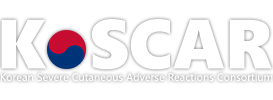Korean Severe Cutaneous Adverse Reactions Consortium
(KoSCAR)
On behalf of all the researchers composing our team, I would like to introduce the Korean Severe Cutaneous Adverse Reactions Consortium (KoSCAR).
As much as drugs may offer valuable benefits to humans, the possibility of undesirable side effects is a burden we must simultaneously carry. While medical staff invoke the fullest extents of their knowledge and experience to minimize these side effects, there are times in which unexpected and serious situations arise.
Severe Cutaneous Adverse Reaction (SCAR) is an acute immune response brought about by drug consumption which consists of skin rashes and various other abnormalities. It is of such rare nature that most doctors will never encounter it even once in their careers, yet numerous drugs continue to generate such life-threatening reactions with high mortality rates and irreversible effects. Despite its severity, the rarity translates to a scarcity of information which makes the pathway to treatment difficult. As such, the establishment of a collaborative nationwide research system is crucial.
In 1988, multiple European countries collaborated to establish a SCAR research system which proposed a standard for diagnosing and treating the disease.
The group’s efforts in consolidating information about the disease’s pathogenesis, risk factors, diagnosis, treatment, and prognosis has helped in broadening the world’s understanding.
It is known that the risk of developing SCAR is dependent on the human leukocyte antigen (HLA). However, because the distribution of HLA identities differs across race and ethnicity, international research findings and corresponding treatment systems cannot easily be applied directly to the Korean people.

Hye-Ryun Kang
Professor of Internal Medicine, Seoul National University HospitalDrug Allergy Research Chief, The Korean Academy of Asthma, Allergy and Clinical Immunology
Director of Editing and Publication, Korean Society for Pharmacoepidemiology and Risk Management
Editor, Journal of Pharmacoepidemiology and Risk Management
Accordingly, the establishment of an appropriate treatment system hinges upon the conducting of research specifically in the context of Korean people who have experienced SCAR. For this reason, many people have demonstrated interest in this research area for a long time. Finally, in 2014, the Korea Institute of Drug Safety & Risk Management designated 25 affiliated regional drug safety centers as the SCAR special interest group (SIG) and launched a campaign to collect SCAR-related information. Thanks to the active support of The Korean Academy of Asthma, Allergy and Clinical Immunology and its associated “Drug Allergy Work Group,” the Korean Severe Cutaneous Adverse Reactions Consortium was established. As of 2020, KoSCAR involves the participation of 49 leading hospitals and operates the largest SCAR registry nationwide, with clinical information from over 1,200 patients. The majority of research results produced from this KoSCAR Registry has been published in prominent journals worldwide, elevating KoSCAR to international standing.
In the future, we hope to foster international exchange with countries such as Taiwan, Malaysia, Singapore, Japan, China, Thailand, the Philippines, Hong Kong in order to better investigate genetic predispositions to SCAR in similar Asian people. By actively interacting with overseas researchers in Europe, America, and Australia and other places across the world, we will help pioneer an international research system and thus promote the welfare of mankind.
If you are interested in participating in or contributing to the Korean SCAR research, we ask that you contact the KoSCAR headquarters in order to receive more detailed information (Phone: 02-2072-2865, E-mail: drug@snuh.org, Seoul National University Hospital, Drug Safety Monitoring Center).
Hye-Ryun Kang, Principal Investigator JAN 2 2021

